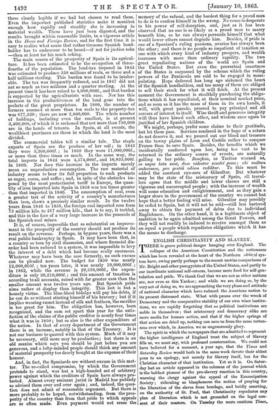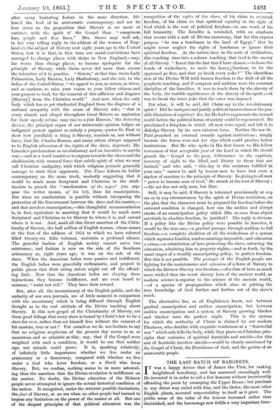ENGLISH CHRISTIANITY AND SLAVERY. /THERE is grave political danger hanging
over England. The
collapse of the American Constitution and the rottenness which has been revealed at the heart of the Northern °Utical sys- tem have, owing partly perhaps to the recent unwise comparisons of Mr. Bright and other panegyrists of the United States, and partly to our inordinate national self-esteem, become mere food for self-gra- tula,tion and pride. We thank God that we are not as other nations are, nor even as this Yankee ; and while we are doing so, by the very act of doing so, we are approaching the very phase and attitude of national character which have reduced the American nation to its present distressed state. What with pearls over the wreck of Democracy and the comparative stability of our own wiser institu- tions, we are rapidly forgetting that no political institutions are noble in themselves ; that aristocracy and democracy alike are. mere media for human action, and that if the higher springs of that action are dried up, nothing can save us from the same rotten- ness over which, in America, we so ungenerously glory.
The spirit in which the newspapers that are admitted to represent the higher intelligence of England treat the subject of Slavery fills us, we must say, with profound consternation. We could not have believed for a moment, a year ago, that the Times and Saturday Review would both in the same week devote their ablest pens to an apology, not merely for Slavery itself, but for the Christian character of that institution. Yet so it is. On Satur- day last an article appeared in the columns of the journal which is the boldest pioneer of the pro-slavery reaction in this country,. warning the clergy against the appeal of the Emancipation, Society ; ridiculing as blasphemous the notion of praying for the liberation of the slaves from bondage, and boldly asserting,. on the authority of St. Paul, that Christianity repudiates any plan of liberation which is not grounded on the legal con- sent of their masters. On Tuesday the more cautious Times, after many hesitating feelers in the same direction, fol- lowed the lead of its aristocratic contemporary, and set its foot down on the proposition that Slavery is no more at variance with the spirit of the Gospel than "sumptuous fare, purple and fine linen." Mrs. Stowe may well ask, in her very telling reply to the address of the women of Eng- land on the subject of Slavery sent eight years ago to the United States, how it is that, in that time our social convictions have managed to change places with theirs in New England,—nay, far worse than change places, to become apologetic for the principle of Slavery, while theirs never did more than excuse the toleration of it in practice. "Sisters," at that time wrote Lady Palmerston, Lady Buxton, Lady Shaftesbury, and the rest, to the lathes of the United States, "we appeal to you, as sisters, as wives, and as mothers, to raise your voices to your fellow citizens and your prayers to God, for the removal of this affliction and disgrace [Slavery] from the Christian world." And now, when the only body which has as yet vindicated England from the disgrace of a national sympathy with the cause of Slavery asks, "that in every church and chapel throughout Great Britain an aspiration for their speedy release may rise to a just Heaven," the Saturday Review, the principal organ of our aristocratic opinion, lodges an indignant protest against so unholy a purpose, quotes St. Paul to show how justifiable a thing is Slavery, reminds us, not without force, that Mr. Charles Buxton, and many others always supposed to be English advocates of the rights of the slave, deprecate Mr. Lincoln's proclamation as revolutionary and an incentive to servile war,—and in a word contrives to express towards the slaves and the abolitionists with unusual force that subtle spirit of what we may call Christian malignity, with which religious journals generally manage to treat their opponents. The Times follows its bolder contemporary on the same track, modestly suggesting that it would be much more Scriptural and Christian in the aboli- tionists to preach the "amelioration of the negro" (we sup- pose the writer means, of his lot), than his emancipation. But since no amelioration is possible without interposing the protection of the Government between the slave and his master,— and that involves emancipation,—this thoughtful recommendation is, in fact, equivalent to asserting that it would be much more Scriptural and Christian to let Slavery be where it is, and extend where it is not. And, amid all this direct assertion of the Chris- tianity of Slavery, the half million of English women, whose names at the foot of the address of 1854 to which we have referred filled twenty-six folio volumes, maintain a profound silence. The graceful leaders of English society cannot serve two mistresses; and fashion is now on the side of the Southern aristocracy as, eight years ago, it was on the side of the slave. When the American ladies were passive and indifferent, the English ladies were gracefully enthusiastic, and prayed in public places that their erring sisters might cut off the offend- ing limb. Now that the American ladies are obeying these injunctions, they become indifferent, and are even heard to murmur, "resist not evil." They have their reward.
But, after all, the inconsistency of the English public, and the audacity of our own journals, are of little moment in comparison with the uncertainty which is being diffused through English thought as to the real attitude of the Divine teaching about Slavery. Is this new gospel of the Christianity of Slavery, are these good tidings that every slave is bound by Christ's law to be a slave for ever, rather than set himself free without the consent of 'his masters, true or not ? For ourselves we do not hesitate to say that no religious scepticism of the present day seems to us so monstrous and so atheistic as this ; nay, that if the Gospel were weighted with such a condition, it would be one that neither sign nor miracle could prove. It is, speaking relatively, of infinitely little importance whether we live under an aristocracy or a democracy, compared with whether we live under a God who loves freedom, or a Devil who loves Slavery. But, we confess, nothing seems to us more astound- ing than the assertion that the Divine revelation is indifferent on the matter. No doubt, the Divine education of the Hebrew people never attempted to ignore the actual historical condition of the nation. It recognized, under the strictest possible limitations, the fact of Slavery, at an era when no other people had learned to impose any limitation on the power of the master at all. But one of the deepest principles of that political education was the
recognition of the rights of the slave, of his claim to eventual freedom, of his claim to that spiritual equality in the sight of God which is the root of political freedom—in one word, of his full humanity. The Israelite is reminded, with au emphasis that recurs with a sort of Divine monotony, that for this express purpose "he was a bondsman in the land of Egypt," that he might never neglect the rights of bondsmen or ignore their spiritual freedom. As the nation rises in the scale of civilization, this teaching rises into a solemn teaching that God is the enemy of all Slavery. "Is not this the fast that I have chosen,—to loose the bonds of wickedness, to undo the heavy,t.burdens, to let the oppressed go free, and that ye break every yoke ? " The identifica- tion of the Divine Will with human freedom is the drift of all the prophetic teaching, and if conquest and serfdom were the constant discipline of the Israelites, it was to teach them by the slavery of the body, the terrible significance of the slavery of the spirit ;—it was to break the inner yoke that the outer was imposed.
But what, it will be said, did Christ say to the revolutionary spirit ? Did he instigate and justify political insurrection or the pos- sible liberation of captives? No; for He had to regenerate the inward world before the political forms of society could be regenerated. He proclaimed a kingdom in which all men were equal, and left it to dislodge Slavery by its own inherent force. Neither He nor St. Paul preached an external crusade against institutions ; simply because the forces were not yet ripe which could produce better institutions. But He who spoke in His first lesson to His fellow townsmen of that acceptable year of the Lord in which He should preach the" Gospel to the poor, deliverance to the captives, recovery of sight to the blind, and liberty to them that are bruised," and who said, "this day is this scripture fulfilled in your ears," cannot be said by honest men to have lent even a shadow of sanction to the principle of Slavery. In giving to all men "power to become sons of God," He struck at the root of Slavery ; —He set free not only men, but Mau.
Still, it may be said, if Slavery is tolerated provisionally at any era or in any circumstances by the spirit of Divine revelation, on the plea that the character must be prepared for freedom before the outward condition is changed, how can the sudden and abrupt stroke of an emancipation policy which lifts at once from abject servitude to absolute freedom, be justified? The reply is obvious. If a policy like the Divine policy were possible in America, it would be the true one,—a gradual passage through serfdom to full freedom,—a complete abolition of all the wickedness of a system which separates families, renders marriage impossible, and education a crime,—a substitution of laws protecting the slave, enforcing his education, admitting him to property-rights,—and so forth, by the usual stages of a steadily emancipating policy, to perfect freedom. But this is not possible. The protegc's of the English people are fighting for the maintenance and extension of a form of Slavery to which the Hebrew Slavery was freedom,—of a class of laws as much more wicked than the worst slavery laws of the ancient world, as
modern science is superior to the science of the ancient world, —of a species of propagandism which aims at putting the true knowledge of God further and further out of the slave's reach.
The alternative lies, as all Englishmen know, not between gradual emancipation and sudden emancipation, but between sudden emancipation and a system of Slavery growing blacker and blacker unto the perfect night. This is the system for which the authority of Christ is claimed by our modern Pharisees, who shudder with exquisite tenderness at a "fratricidal war" which only kills the body, while they prove on Christian prin- ciples that centuries of spiritual fratricide and suicide—for this sort of fratricide involves suicide—would be clearly sanctioned by the Gospel of Christ, the Providence of God, and the genius of an aristocratic people.































 Previous page
Previous page